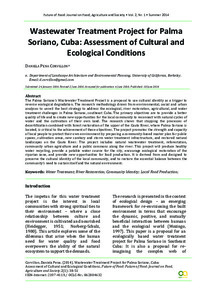| dc.date.accessioned | 2014-06-26T12:02:35Z | |
| dc.date.available | 2014-06-26T12:02:35Z | |
| dc.date.issued | 2014-06-10 | |
| dc.identifier.issn | 2197-411X | |
| dc.identifier.uri | urn:nbn:de:hebis:34-2014062645560 | |
| dc.identifier.uri | http://hdl.handle.net/123456789/2014062645560 | |
| dc.language.iso | eng | |
| dc.publisher | Department of Organic Food Quality and Food Culture at the University of Kassel, Germany and Federation of German Scientists (VDW) | eng |
| dc.rights | Urheberrechtlich geschützt | |
| dc.rights.uri | https://rightsstatements.org/page/InC/1.0/ | |
| dc.subject | Water Treatment | eng |
| dc.subject | River Restoration | eng |
| dc.subject | Community Identity | eng |
| dc.subject | Local Food Production | eng |
| dc.subject.ddc | 630 | |
| dc.title | Wastewater Treatment Project for Palma Soriano, Cuba: Assessment of Cultural and Ecological Conditions | eng |
| dc.type | Aufsatz | |
| dcterms.abstract | The Palma Project is an experiment in the use of cultural identity as a social trigger to address ecological degradation. The research methodology draws from environmental, social and urban analyses to unveil the best strategy to address the ecological, river restoration and water treatment challenges in Berkeley, California’s “Sister City” in southeast Cuba, Palma Soriano. The objective is to provide a better quality of life and to create new opportunities for the local community to reconnect with natural cycles of water and the cultivation of their own land.
The project aim is to promote the strength and capacity of local communities to protect their own environment based upon a master plan, which includes natural wastewater treatment, reforestation, urban agriculture and the facilitation and utilization of a public space bordering the major river which flows by Palma Soriano, the Cauto. This project will contribute and produce healthy water recycling for Palma, provide a potable water source for the city, encourage ecological restoration of the riparian zone of the Cauto, and provide new opportunities for food production. It is designed to preserve the cultural identity of the local community, and to restore the essential balance between the community’s need to sustain both itself and the natural environment. | eng |
| dcterms.accessRights | open access | |
| dcterms.bibliographicCitation | In: Future of Food: Journal on Food, Agriculture and Society. Witzenhausen : University of Kassel, Department of Organic Food Quality and Food Culture. - Vol. 2, No. 1 (2014), S. 38-51 | |
| dcterms.creator | Corvillon, Daniela Peña | |

